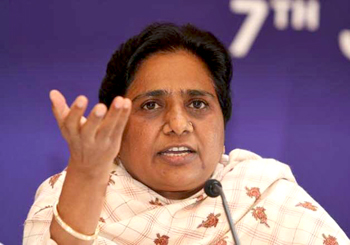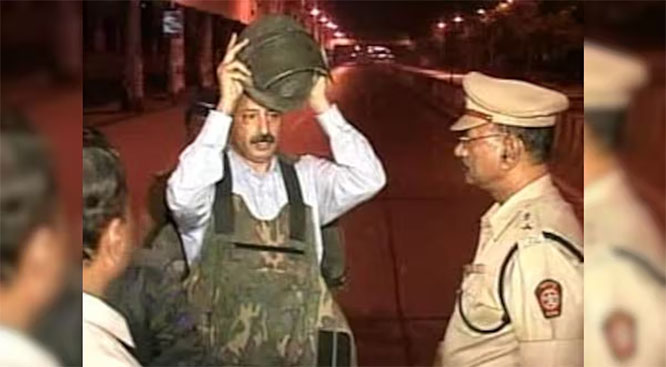Lucknow, Oct 10: MAKING A strong pitch for Muslim support in the Uttar Pradesh assembly elections next year, BSP chief Mayawati on Sunday told the minority community not to “waste” their votes on the Samajwadi Party (SP) or the Congress if they want to defeat the BJP.

Addressing a rally here on the occasion of BSP founder Kanshi Ram’s death anniversary, Mayawati said the internal differences in SP chief Mulayam Singh Yadav’s family had weakened the party and divided its supporters.
“Akhilesh ke kheme ke log candidate honge, toh Shivpal ke log andar hi andar unhe haraane ki koshish karenge. Aur agar Shivpal ke kheme ke log candidate honge, toh Akhilesh ke log unhe haraane ki koshish karenge. Muslim samaj ko aise me SP ko apna vote dekar kharab nahi karna hai. (If the candidate is from Akhilesh’s camp, Shivpal’s supporters will try to defeat him. If the candidate is from Shivpal’s camp, Akhilesh’s supporters will try to defeat him. In this situation, the Muslim community should not waste its vote on the SP),” she said.
On the Congress, she said the party does not have a vote base, and voting for it will only benefit the BJP.
She said the Muslim community should, therefore, unitedly vote for the BSP to defeat the BJP. With the state “having 22 to 23 per cent Dalit votes, BSP can win with the help of Muslim votes,” she said. The community should avoid division of its votes, which benefited the BJP in the 2014 Lok Sabha elections, she said.
Attacking the BJP-led government at the Centre in her 85-minute speech, Mayawati said: “The discrimination against Muslims increased manifold after the formation of the BJP government, and they have been targeted in the name of gau raksha, ghar wapsi, love jehad… The community members are now insecure about protection of their religion, lives and property.”
Citing the incidents in Dadri, Mewat and Una, she said atrocities were being committed against both Muslims and Dalits on the same issue.
Mayawati said “misinformation” was being spread that the BSP may form the next government with BJP’s support. “I trust that the Muslim community will not be misled by this propaganda,” she said. She added that her government would also implement the Supreme Court’s orders on the Ram temple dispute in Ayodhya.
She said the state assembly elections are “a matter of life and death for the BJP, and the party will try all tactics to win them”. “Pradhan Mantri ke August 15 ke bhashan se hi pata lag gaya tha ki wo chunavi swarth ke liye kuch bhi kar sakte hain aur kisi bhi had tak ja sakte hain (PM’s Independence Day speech made it clear that he can go to any extent for electoral benefit),” she said.
“BJP ab Bharat-Pakistan seema par atankwad ki vardaton ko bhi chunav me bhunane ki koshish karegi (BJP is even trying to gain electoral benefits from the terror incidents on India-Pakistan border),” she said.
She said the decision to carry out surgical strikes came late, and such strikes should have been carried out after the Pathankot attack in January. While many countries have carried out surgical strikes, “these foreign governments don’t try to take credit for them, the way this government is trying to take credit for the army’s work in our country,” she said.
Referring to Modi’s scheduled visit to Lucknow on October 11, she said: “Jawanon ki chita ki aag abhi thandi bhi nahi hui hai, aur pradhan mantri Lucknow mein Dussehra manaane aa rahe hain. Wo UP mein Diwali bhi manaane aa sakte hain, jabki BJP ko yeh tyohar dhoomdhaam se nahi… manaane chahiye the. (The funeral pyres of soldiers are still warm, but the PM has decided to come to Lucknow to celebrate Dussehra. He may also come to UP to celebrate Diwali. The BJP should not be observing these festivals with fanfare).”
While 18 soldiers were killed in the Uri attack on September 18, another soldier succumbed to his injuries on September 30.
She said Modi “has set a record of foreign trips but is still unable to clearly spell out the foreign policy because of which the borders of the country are not fully secure. After two years, they have now thought about securing the borders”.
She alleged that the Modi government was working for rich industrialists and capitalists, not for the poor, Dailts and OBCs. She also accused the BJP government of “misusing central agencies like the CBI to harass its opponents” and said the “Congress has also done this earlier.”








Comments
Add new comment